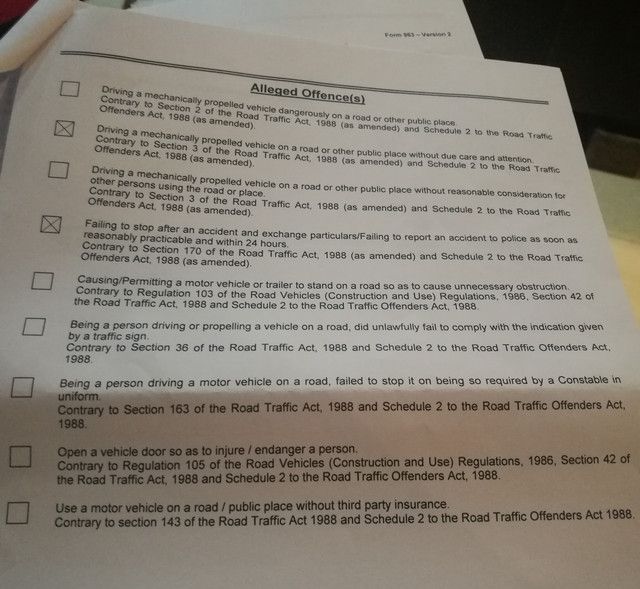Form 963 - What Should I Do?
The Police are now serving Form 963s more regularly, especially in cases involving allegations of Failing to Stop and Failing to Report. Completing it correctly is essential and a failure to do so may be a criminal offence.

Where the Police establish that there has been a Road Traffic Collision, they will often serve a Form 963 rather than a request for driver details. If there has been an accident or damage caused, the 14 day Notice of Intended Prosecution requirement may not apply.
What does the form tell me?
The form will include the alleged offences that are being considered for charge, these are all discussed on the Motoring Law section of this website.
It will also inform you of the location, date and time of the alleged offence.
Do I have to reply?
These notices have the same effect as a Section 172 request for Driver Details. As a result, a failure to respond can lead to the imposition of 6 penalty points or a sentence to the level of the substantive offence. As such, there is a positive duty to respond to the form and to complete it to the best of your knowledge.
However, it is important to note that Section 112 (which underpins Section 172) only relates to driver details. If you read the Form 963 carefully, it makes clear that only failing to provide the identity of the driver renders you vulnerable to prosecution.
What about other information?
Once you accept that you were the driver, that is the legal requirement satisfied. However, the Police will be seeking information about how the alleged accident/collision occurred. This is an opportunity to set out why a collision was not as a result of your actions and to explain why (if indeed this is the case) the accident was not reported.
It can be very important to ensure that this document is filled out accurately and carefully. It can be used as a Prosecution exhibit if the Police choose to charge the driver. The form is not being completed under caution so often it can be possible to seek to exclude the contents of the document.
How do I return the form?
You should return the form in the manner prescribed, as with Section 172 notices the Courts have held that failing to return properly can amount to an offence.
What else can be done?
This stage is an excellent opportunity to draft representations as to why you should not be charged with a criminal offence. These can be drafted with legal assistance and often mean that the proceedings are taken no further.
This is particularly useful if there is a clear defence to any of the charges that are being investigated. It can ensure that the proceedings are taken no further.
Fill in the Below to Contact Rhys and to obtain legal advice










